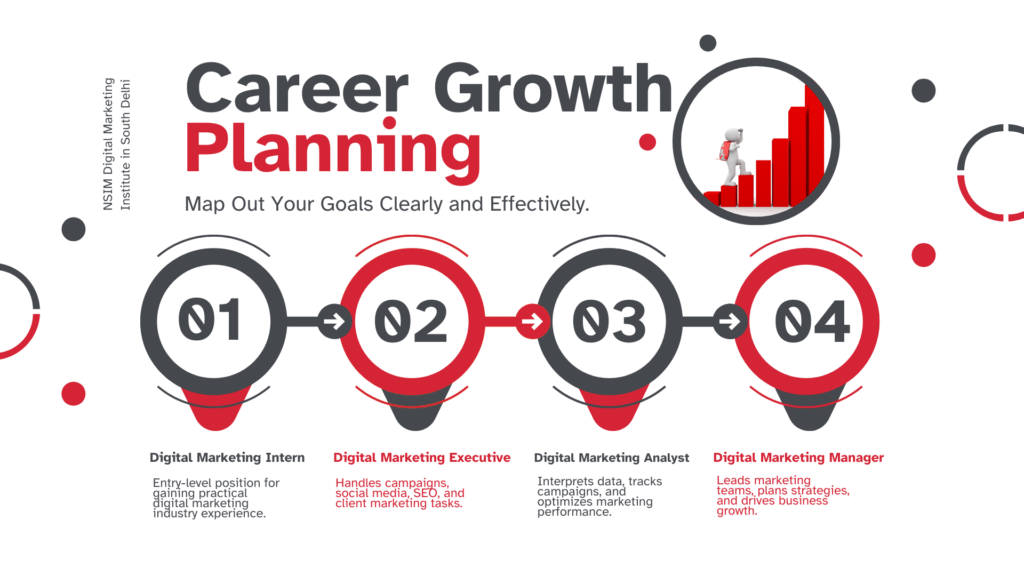Introduction
The digital marketing landscape is evolving faster than ever, and one of the most significant driving forces behind this transformation is Artificial Intelligence (AI). By 2025, AI tools will have fundamentally reshaped the way marketers approach strategy, creativity, and consumer engagement. From automating tedious tasks to analyzing vast amounts of data, AI promises to unlock new levels of efficiency and insight. But how does this impact careers in digital marketing?
In this blog, we’ll explore how AI tools are changing the digital marketing profession, what skills are becoming crucial, and how professionals can prepare to thrive in an AI-enhanced world.
1. The Rise of AI in Digital Marketing: A Brief Overview
As we step into 2025, AI is no longer a futuristic concept. It’s embedded in almost every aspect of digital marketing—whether it’s through automated content creation, predictive analytics, chatbots, or customer journey mapping. AI is enabling marketers to do more with less by reducing human effort in repetitive tasks and providing deeper insights into customer behavior.
In the coming years, it’s expected that AI-powered tools will continue to dominate the industry, leading to more precise targeting, personalized experiences, and faster decision-making. It’s not just about replacing traditional jobs; it’s about enhancing roles and making digital marketing efforts more effective.
2. AI Tools Making Waves in Digital Marketing
To understand how AI is impacting digital marketing careers, it’s essential to look at some of the most popular tools and their applications.
a. Content Creation and Copywriting
Creating high-quality, engaging content has always been a crucial part of digital marketing. But with AI-driven content creation tools like Jasper (formerly Jarvis), Copy.ai, and Writesonic, the process is faster and more efficient. These tools can generate blog posts, social media captions, email newsletters, and more in seconds—based on brief inputs from marketers.
While AI-generated content still requires human oversight to ensure it aligns with brand voice and messaging, these tools enable marketers to focus on the strategy and optimization of content rather than spending hours drafting initial drafts.
b. Predictive Analytics and Customer Insights
AI-powered tools like Google Analytics 4, HubSpot, and Salesforce Einstein use machine learning to analyze consumer data, predict behavior, and deliver actionable insights. This enables digital marketers to create more targeted campaigns, predict sales trends, and understand customer preferences with precision.
For example, predictive analytics can help marketers determine the best time to send an email campaign, predict customer churn, or uncover emerging trends. This allows for more proactive strategies and higher ROI.
c. Chatbots and Conversational AI
Customer service and engagement are being revolutionized by AI-powered chatbots and virtual assistants. Tools like Drift, Intercom, and Zendesk use natural language processing (NLP) to handle customer inquiries, provide product recommendations, and even complete transactions—all without human intervention.
For digital marketers, chatbots can gather valuable customer data, offer personalized experiences, and maintain 24/7 customer support, making it easier to engage with customers at scale.
d. Automated Social Media Marketing
Managing social media campaigns can be overwhelming, but AI tools like Hootsuite, Buffer, and Sprout Social are simplifying this process. These platforms use AI to schedule posts, track engagement, and suggest optimal posting times.
By using these AI-driven tools, digital marketers can enhance their social media strategies, automate routine tasks, and analyze campaign performance in real-time.
3. How AI is Shaping Digital Marketing Careers in 2025
As AI tools become more integrated into digital marketing workflows, the roles and responsibilities of marketers are changing. While some tasks may be automated, new opportunities are emerging for professionals who can leverage AI effectively.
a. Emphasis on Data-Driven Decision Making
In 2025, marketers will be expected to become data-driven decision-makers, using AI tools to analyze and interpret customer data. While human intuition and creativity will always play a significant role, marketers will need to rely heavily on data to craft effective strategies.
Key Skill: Data Analysis and Interpretation
Marketers will need to develop strong data analysis skills and a solid understanding of AI-powered analytics tools. Those who can interpret complex data sets and derive actionable insights will be in high demand.
b. New Roles in AI Management and Optimization
As AI tools become more prevalent, new roles will emerge in the digital marketing space. Marketers will need to manage, optimize, and troubleshoot AI-driven campaigns. These roles will require a blend of technical expertise and creative thinking.
Key Skill: AI Tool Management and Optimization
Marketers will need to become proficient in working with AI tools and ensuring they are effectively integrated into their workflows. Roles like AI Campaign Manager or AI Integration Specialist may become common, focusing on managing the automation process and optimizing AI tools for maximum impact.
c. Content Strategy Over Content Creation
While AI can generate content, marketers will shift their focus from content creation to content strategy. AI tools can help produce large volumes of content, but it’s the marketer’s job to ensure it aligns with brand values, resonates with the target audience, and drives measurable results.
Key Skill: Strategic Content Planning
Marketers will need to think strategically about how to use AI-generated content to achieve broader business objectives. They will also need to stay ahead of trends, identifying the types of content that resonate most with their audience and leveraging AI tools to scale those efforts.
d. Personalization at Scale
One of the most exciting benefits of AI in digital marketing is the ability to deliver hyper-personalized experiences at scale. AI tools can segment audiences based on behavior, preferences, and demographics, allowing marketers to create tailored messages for each individual.
Key Skill: Personalization and Customer Experience Design
Marketers will need to hone their ability to design personalized customer journeys and optimize the user experience. Understanding the power of AI in segmentation and personalization will be essential to staying competitive in the field.
e. Creative Thinking and Human Connection
Even though AI is capable of analyzing data and generating content, it lacks the emotional intelligence and creativity that human marketers bring to the table. In 2025, AI will complement—not replace—the creative aspects of marketing.
Key Skill: Creativity and Emotional Intelligence
Marketers will still need to craft compelling brand stories, design innovative campaigns, and connect with audiences on a deeper level. Creativity, empathy, and a human touch will remain essential, even in a world powered by AI.

4. How to Prepare for the AI-Driven Future of Digital Marketing
For digital marketers looking to stay ahead of the curve, here are a few tips on how to thrive in an AI-enhanced landscape:
- Embrace Continuous Learning: AI tools are evolving rapidly. Stay updated with the latest technologies and trends by taking courses, attending webinars, and experimenting with new AI platforms.
- Develop a Data-Driven Mindset: Invest time in learning data analysis, so you can leverage AI’s insights to make informed decisions.
- Focus on Creativity and Strategy: While AI handles the heavy lifting, marketers will still need to bring creativity, emotional intelligence, and strategic thinking to the table.
- Collaborate with AI, Don’t Compete with It: AI is a tool to enhance your capabilities, not a replacement for your role. Learn how to work with AI to streamline your processes and improve efficiency.
5. Conclusion: The Future of Digital Marketing Careers in 2025 and Beyond
In 2025, digital marketing careers will be more dynamic and tech-driven than ever. AI will continue to reshape the industry, offering new opportunities for those who are willing to adapt and learn. While some jobs may evolve or disappear, new roles will emerge that require a blend of technical, analytical, and creative skills.
Marketers who embrace AI tools, develop strong data analysis abilities, and focus on strategy will thrive in this exciting new era. The key to success in 2025 will not be about competing with AI, but rather working alongside it to create more personalized, efficient, and impactful marketing campaigns.




